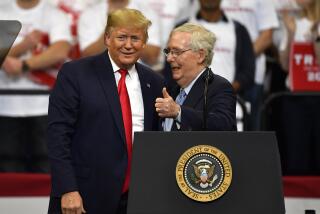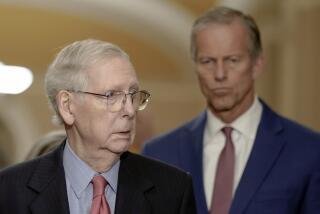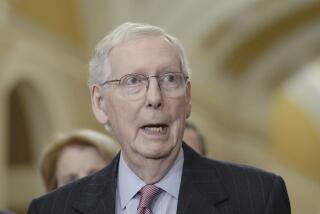Obama embraces the ‘McConnell provision,’ but McConnell doesn’t
My post Saturday calling for an end to the debt ceiling drew quite a few comments from seething readers who thought I was calling for Washington to pile on an endless amount of debt. Just to be clear, my point isn’t that the nation’s enormous and growing debt is a good thing. It’s that Congress,which controls the federal purse, has better ways to rein in its borrowing than stiffing its creditors.
Still, some people aren’t willing to count on Washington to restrain itself, so they’re not willing to give up the nuclear option of the debt ceiling. So how about this: Let the president raise the debt ceiling unless two-thirds of the House and Senate vote against it.
That’s the Obama administration’s position, as explained last week by Treasury Secretary Timothy Geithner. Some Washington insiders -- most notably Senate Minority Leader Mitch McConnell (R-Ky.) -- have said President Obama wanted the power to raise the debt limit unilaterally. But Geithner said Obama had merely recycled a proposal that McConnell himself had made during last year’s fight over the debt ceiling. His idea, which Congress eventually adopted, cleared the way for Obama to raise the limit by $2.5 trillion in 2011 and 2012.
Under that approach, which Geithner dubbed the “McConnell provision,” the president would alert Congress before raising the debt limit, and lawmakers would have a limited amount of time to pass a resolution to block the move. If they did, the president could veto the resolution, forcing those who don’t want to lift the debt ceiling to round up two-thirds majorities in both chambers to override the veto. And unlike McConnell’s original proposal, the new procedures would be in place permanently, with no upper boundary to the debt limit.
The advantage to this approach is that it puts the onus on those who want the government to default, not on those who want the federal government to pay its bills. The disadvantage is that it would let more lawmakers demagogue the issue -- as then-Sen. Obama (D-Ill.) did when President George W. Bush sought an increase in the debt ceiling in 2006 -- without putting the federal credit rating at risk.
McConnell, by the way, doesn’t seem to like the McConnell provision any more. “Why on earth would we even consider giving a president who’s brought us four years of trillion-dollar deficits unchecked authority to borrow? He’s the last person who should have limitless borrowing power,” the senator said last week.
Never mind that the administration wasn’t calling for unchecked authority to raise the debt ceiling, just a higher threshold for forcing a default. Nor does the executive ranch have any authority to borrow money. All that power rests with Congress, whose decisions about taxes, appropriations and entitlements are what force the Treasury into the red.
McConnell seemed to acknowledge as much, saying lawmakers need a debt ceiling because they can’t control themselves otherwise. “Look, the only way we ever cut spending around here is by using the debate over the debt limit to do it,” he said.
Is it asking too much of Congress to expect lawmakers to cut spending without threatening not to honor the federal government’s commitments to its creditors, beneficiaries, contractors and employees? For McConnell, the answer apparently is yes. But he’d still have that opportunity under the administration’s debt-ceiling proposal, which is probably why he came up with the idea in the first place.
ALSO:
Same-sex marriage meets the high court
Gulp! The high cost of Big Soda’s victory
Gay marriage: Scalia knew this day would come
Follow Jon Healey on Twitter @jcahealey
More to Read
A cure for the common opinion
Get thought-provoking perspectives with our weekly newsletter.
You may occasionally receive promotional content from the Los Angeles Times.











